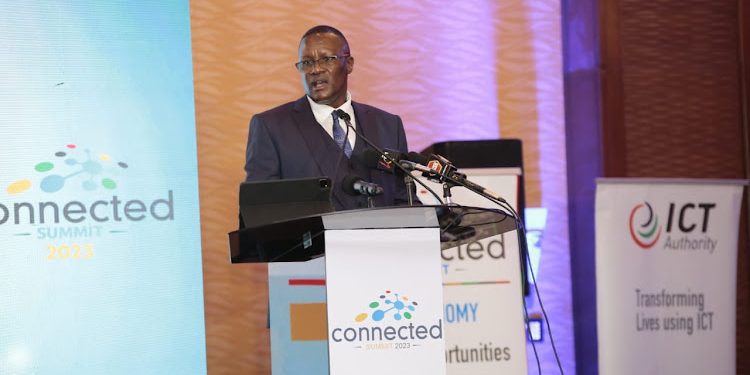The ICT Authority Bill 2024 proposed by ICT Cabinet Secretary, Eliud Owalo, intends to regulate the sector by demanding practitioners obtain operational licences for the services they provide.
- If the bill is signed into law, the ICT Authority will categorize services according to skills and experience, and provide accreditation for practitioners based on that template.
- The ministry of ICT says the proposed Authority shall be overseen by a board consisting of a chairman appointed by the president, the principal secretaries of both the ICT and the National Treasury, the Attorney General, an ex-officio CEO, and five appointees of the ICT’s Cabinet Secretary.
- The registration will also allow the government to integrate ICT into its system for easier supervision and inspection of practitioners – which would guarantee improved security in an increasingly complex sector.
“Where the Authority approves the application, the Authority shall accredit the applicant and where the Authority rejects the application, the Authority shall inform the applicant of such rejection and provide reasons,” the proposed legislation states.
After applying for a licence, the ICT practitioner will wait for 30 days for approval to be processed. The ICT Authority will renew each practitioner’s licence annually if the bill is approved. Suspension can be made if an ICT practitioner is proven to have violated the bounds of accreditation, or engaged in illegal activity.
“Any person who knowingly provides false information to the Authority in making an application for accreditation, unlawfully destroys any data or electronic record or ICT infrastructure, provides ICT services without prerequisite accreditation – commits an offence and shall be liable on conviction to imprisonment of a term not exceeding five years or fine not exceeding five million shillings or both,” the bill further proposes.
With the imposition of the 1.5% digital tax in the Finance Bill 2024, the ICT Authority Bill seeks to establish a foothold in the sector in a manner that will determine which practitioners can be targeted.
The ministry of ICT oversaw an allocation of more than US$ 100 million in the sector’s initiatives last year. As it intends to widen investment in similar programs this year, the ministry wishes to better structure funding streams in order to gauge overall growth and potential lapses.
A Challenge for the Profession
So far, the bill does not elaborate what constitutes a legal ICT practitioner. For a dynamic field like ICT that can rapidly be taken up by individuals not trained in a formal setting, there are concerns that if the bill passes, the sector could remain stunted.
“A licence may be useful to enforce ethical and security standards for related practice but it presents more problems than it solves. First, it will be a glass ceiling for young talent, IT geeks in college may be denied chances to try it out in the world of practice. Secondly, IT professionals have very many fields of practice and are quite fluid, say from databases to networking to programming, needless to say how all are quite dynamic and as such, these licences will impede keeping up with changes,” IT practitioner, Collins Rotich, told The Kenyan Wall Street.
Rotich has also doubted the efficacy of the accreditation model that will be applied once the bill is enacted. According to him, the Engineering Board of Kenya (EBK) has a better way of handling accreditation without disrupting the flexibility of its professionals.
“Consider how EBK works; it registers universities offering the courses and ensures their curriculum is up to standards, and once an engineer graduates, they get a license that allows them to practice in various fields of practice as per the course,” Rotich said.
“ICT and computer professionals usually can be classified as falling between liberal arts (math) and Electrical/Electronic Engineering. Serving us under the same license system, we wouldn’t not only be taking advantage of an already existent body but also, IT professionals will not be limited in practice to a single field. I could be a network engineer this year, and next year, I could be coding.”
A similar bill was introduced in 2016 by then Majority Leader of the National Assembly Aden Duale and MP Godfrey Osotsi. ICT practitioners were expected to have completed 3 years of relevant experience as well as pay annual licence fees.
The bill was later withdrawn after an outcry from the tech community citing that Kenya’s digital space was too young, and such directives could hinder innovation.
The bill resurrected in 2018 with less stringent eligibility requirements for ICT practitioners. That did not make it easier for it to sail through, and it died again.
In November 2020, a similar bill resurfaced with amendments that were even less stringent. Although it was passed at the time, the ICT sector remained largely unregulated and anyone with a capacity to perform relevant functions was free to do it. No licences were required and no threat of persecution was invoked.
See Also:
Kenya’s ICT Value Output Rose by 5.8% Last Year – KNBS Survey




